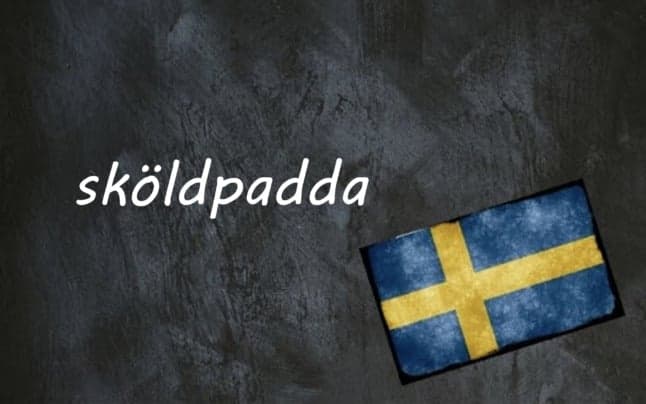Swedish word of the day: sköldpadda

Today's word of the day is a great example of Sweden's more literal way of naming animals.
Sköldpadda is the Swedish word for turtle, also used for the turtle's non-amphibious cousin, a tortoise.
But why have we chosen to highlight this as the Swedish word of the day today?
The answer is simple, sköldpadda is not only a great word in its own right, but it also demonstrates the Swedish language's more literal way of naming animals, when compared with English.
The literal translation of sköldpadda is "shield toad", which is a pretty accurate description of a tortoise's appearance.
Other entertaining - and very literal - Swedish animal names include näbbdjur or "beaked animal" for a duck-billed platypus, and fladdermus or "flap mouse" for a bat.
Unfortunately, this doesn't mean that superhero Batman is known as fladdermusmannen - "flap mouse man" in Swedish - but his original Swedish name - used between 1951 and 1990 was läderlappen or "leather patch", the Swedish name for a type of bat known as a Vesper bat in English.
The Swedish word for sloth is sengångare, or "late-walker", reflecting this animal's relaxed attitude to getting anywhere fast - some sloths move so slowly that green moss has been known to grow in their fur.
Similarly, a bältdjur - "belted animal" - is the Swedish term for an armadillo - although, the English word - originally from Spanish, meaning "small armoured animal" - is also pretty literal.
Another Nordic animal with a literal name is an isbjörn or an "ice bear" - a slightly more literal translation than English's "polar bear".
Visitors to aquariums may have come across a bläckfisk or "ink fish" - a squid, or even an åttaarmade bläckfisk - an "eight-armed ink fish" or octopus.
A noshörning or "nose-horn" is the Swedish word for a rhinocerous, and a flodhäst or "river horse" is a hippopotamus - although technically these animals' English names are also literal descriptions - English just never got around to translating them from ancient Greek, where hippos means "horse", and potamós means "river". Similarly, the original Greek rhinokerōs comes from rhis "nose" and keras, "horn".
Are there any literal Swedish animal names we've missed? Let us know!
Villa, Volvo, Vovve: The Local’s Word Guide to Swedish Life, written by The Local’s journalists, is now available to order. Head to lysforlag.com/vvv to read more about it. It is also possible to buy your copy from Amazon US, Amazon UK, Bokus or Adlibris.
Comments (2)
See Also
Sköldpadda is the Swedish word for turtle, also used for the turtle's non-amphibious cousin, a tortoise.
But why have we chosen to highlight this as the Swedish word of the day today?
The answer is simple, sköldpadda is not only a great word in its own right, but it also demonstrates the Swedish language's more literal way of naming animals, when compared with English.
The literal translation of sköldpadda is "shield toad", which is a pretty accurate description of a tortoise's appearance.
Other entertaining - and very literal - Swedish animal names include näbbdjur or "beaked animal" for a duck-billed platypus, and fladdermus or "flap mouse" for a bat.
Unfortunately, this doesn't mean that superhero Batman is known as fladdermusmannen - "flap mouse man" in Swedish - but his original Swedish name - used between 1951 and 1990 was läderlappen or "leather patch", the Swedish name for a type of bat known as a Vesper bat in English.
The Swedish word for sloth is sengångare, or "late-walker", reflecting this animal's relaxed attitude to getting anywhere fast - some sloths move so slowly that green moss has been known to grow in their fur.
Similarly, a bältdjur - "belted animal" - is the Swedish term for an armadillo - although, the English word - originally from Spanish, meaning "small armoured animal" - is also pretty literal.
Another Nordic animal with a literal name is an isbjörn or an "ice bear" - a slightly more literal translation than English's "polar bear".
Visitors to aquariums may have come across a bläckfisk or "ink fish" - a squid, or even an åttaarmade bläckfisk - an "eight-armed ink fish" or octopus.
A noshörning or "nose-horn" is the Swedish word for a rhinocerous, and a flodhäst or "river horse" is a hippopotamus - although technically these animals' English names are also literal descriptions - English just never got around to translating them from ancient Greek, where hippos means "horse", and potamós means "river". Similarly, the original Greek rhinokerōs comes from rhis "nose" and keras, "horn".
Are there any literal Swedish animal names we've missed? Let us know!
Villa, Volvo, Vovve: The Local’s Word Guide to Swedish Life, written by The Local’s journalists, is now available to order. Head to lysforlag.com/vvv to read more about it. It is also possible to buy your copy from Amazon US, Amazon UK, Bokus or Adlibris.
Join the conversation in our comments section below. Share your own views and experience and if you have a question or suggestion for our journalists then email us at [email protected].
Please keep comments civil, constructive and on topic – and make sure to read our terms of use before getting involved.
Please log in here to leave a comment.